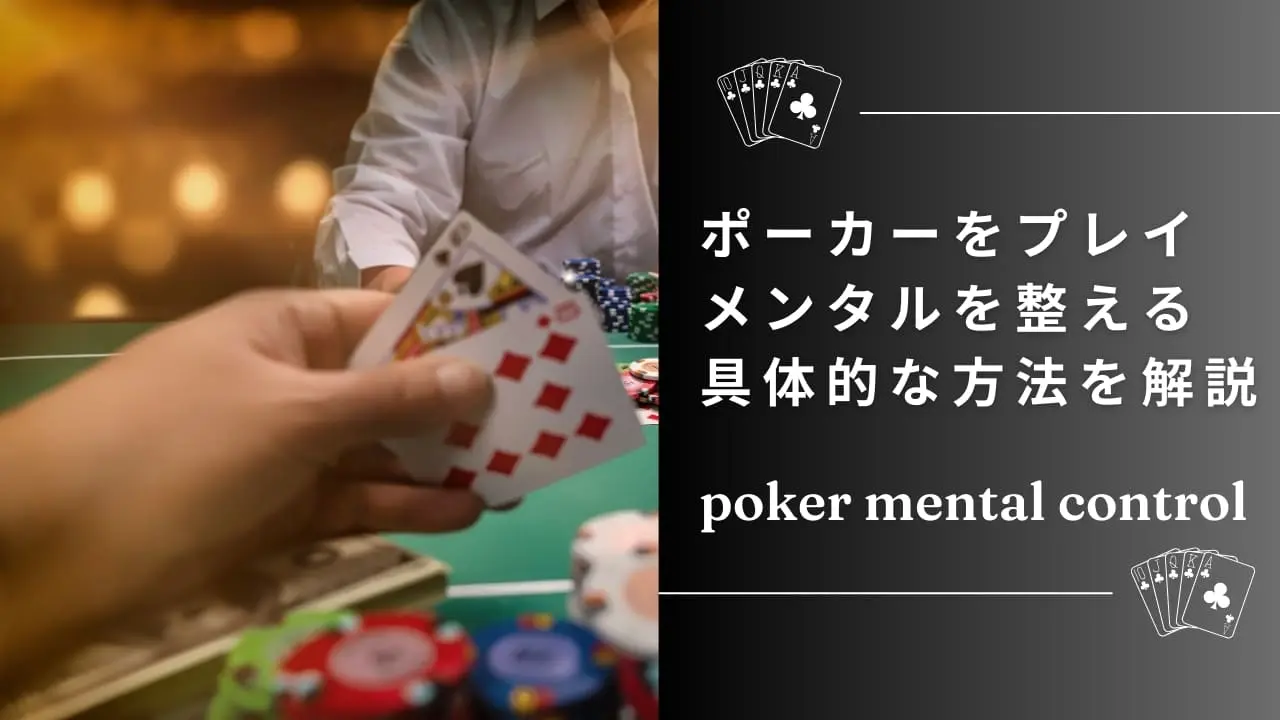Poker is not just a game of luck—it requires skill, strategy, and discipline. Among these, mental control is a crucial factor for long-term success. Even the best strategies can fail if emotions take over, leading to poor decision-making and costly mistakes.
Poker outcomes can be influenced by short-term luck, but long-term results depend on probability and strategic play. Players who fail to control their emotions often go on “tilt,” making reckless bets to recover losses, which typically leads to further losses. In contrast, those who remain calm and focused can weather bad beats and make optimal decisions, ultimately increasing their winnings over time.
Training Your Poker Mental Control
If you want to improve your poker win rate, mastering mental control is essential. Here are three key strategies:
1. Preventing Tilt (Emotional Play)
Tilt occurs when players become frustrated by losing streaks or bad beats, leading them to make irrational decisions. To prevent tilt, consider the following:
- Analyze Losses Objectively: Instead of reacting emotionally, evaluate whether your play was strategically sound or if it needs improvement.
- Take Breaks: If you notice frustration building, step away from the game, take deep breaths, or do some light stretching.
- Focus on Improvement: Instead of dwelling on losses, ask yourself, “How can I play better next time?”
By cultivating a habit of rational analysis and self-control, you can significantly reduce emotional decision-making and play with a clear mind.
2. Self-Analysis and Mental Strength
To strengthen your mental game, you need self-awareness and consistent evaluation. Try these techniques:
- Review Your Sessions: Identify moments where your emotions influenced your decisions and recognize patterns.
- Understand Your Emotional Triggers: Determine what situations cause you to tilt and develop strategies to counter them.
- Practice Mindfulness Meditation: Regular meditation can improve focus, emotional stability, and decision-making skills.
Tracking your mental state over multiple sessions will help you identify areas for improvement and reinforce positive habits.
3. Playing with a Long-Term Mindset
Poker results are highly variable in the short term, but probability ensures that good decisions pay off in the long run. To develop a long-term perspective:
- Don’t Get Emotional Over Short-Term Wins or Losses: Accept variance as part of the game and stay focused on your overall performance.
- Trust the Math: If you consistently make statistically correct plays, positive results will follow over time.
- Stay Committed to Your Strategy: Don’t abandon a well-thought-out strategy just because of a few unlucky hands.
By maintaining a long-term mindset, you can avoid making emotional decisions and keep your poker strategy on track.
Practical Techniques for Mental Control
Here are some additional strategies to help you maintain peak mental performance at the table:
1. Establish a Pre-Game Routine
Developing a routine before you play can put you in the right mindset. Many professional athletes follow strict pre-game rituals, and the same approach works for poker players.
- Settle Your Mind Before Playing: Take a few deep breaths, stretch, or do a quick meditation to clear your thoughts.
- Stay Consistent: Follow the same routine regardless of wins or losses to create a sense of stability.
2. Read Your Opponents’ Psychology
Poker is as much a psychological battle as it is a strategic one. Understanding your opponents’ mental state can give you a significant edge.
- Observe Behavioral Changes: Pay attention to opponents who suddenly become more aggressive or defensive—they may be reacting emotionally.
- Exploit Tilted Players: If an opponent is on tilt, they are more likely to make mistakes. Adjust your strategy to capitalize on their reckless play.
3. Take Strategic Breaks
Playing poker for long hours without breaks can lead to mental fatigue and poor decision-making.
- Avoid Extended Sessions: Take regular breaks to maintain concentration.
- Disconnect During Breaks: Step away from poker-related thoughts to reset your mind. Listen to music, go for a walk, or do light exercise.
Success Stories of Mental Control in Poker
Professional Player Example
One professional poker player implemented a strict “10-minute break rule” whenever they felt frustrated. By stepping away, listening to music, and practicing short meditation, they prevented tilt and improved their long-term results.
Amateur Player Improvement
A beginner player who focused on self-analysis and meditation significantly improved their mental game. By consistently reviewing their decisions and recognizing emotional triggers, they learned to stay calm under pressure and improved their win rate.
Mental Control in Other Fields
- Tennis – Novak Djokovic’s Mental Routine: The world-class tennis player follows structured routines in training, diet, and mindset to minimize fluctuations in performance. He also uses breathing techniques to maintain composure during matches—an approach that can be adapted to poker.
- Shogi(Japanese Chess) – Habu Yoshiharu’s Strategic Patience: The legendary Japanese chess player is known for his ability to remain calm under extreme pressure. He regularly reviews past games to learn from mistakes, a practice that poker players can adopt for long-term improvement.
Summary
Mental control in poker is not just about avoiding tilt—it’s a trainable skill that can significantly improve your results. By following structured routines, staying self-aware, and maintaining a long-term perspective, you can play with greater confidence and consistency.
Whether you’re a casual player or an aspiring pro, integrating these mental strategies into your game will help you make better decisions, maximize winnings, and enjoy the game without unnecessary frustration. Start training your mental game today and see the difference in your poker performance!


